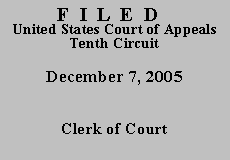

| WILLIAM D. McDONALD,
v.
MARSHA VAN HOUTTE, individual
and official capacity; and CHOCTAW
POLICE DEPARTMENT |
No. 05-6132
(D.C. No. 05-CV-63-H) (W.D. Okla.) |
We review a district court's determination of standing de novo. Comm. to Save the Rio Hondo v. Lucero, 102 F.3d 445, 447 (10th Cir. 1996). To bring a claim in a federal court, a plaintiff must demonstrate that he has standing to invoke the court's jurisdiction. Lujan v. Defenders of Wildlife, 504 U.S. 555, 560 (1992). To establish standing, a party must show that he has suffered a concrete and particular injury in fact, that there is a causal connection between the injury and the defendant's conduct, and that a decision in the plaintiff's favor is likely to redress the injury. Id. at 560-61.
In general, a party "must assert his own legal rights and interests, and cannot rest his claim to relief on the legal rights or interests of third parties." Kowalski v. Tesmer, 125 S. Ct. 564, 567 (2004) (quotation omitted). However, when the standing requirements are otherwise met and the party who suffered the actual harm is not able to assert her claim directly, a plaintiff with a close relationship to that party may assert standing on behalf of the third party. Id.
While McDonald clearly qualifies as having a close relationship with his wife, he has presented no facts demonstrating that his wife is not able to assert her claims directly. The fact that she is imprisoned is not a bar to bringing a civil rights claim. See, e.g., Searles v. Van Bebber, 251 F.3d 869 (10th Cir. 2001) (prisoner successfully brought § 1983 claim).
Because McDonald has not demonstrated that his wife is unable to assert her own claims, he does not have standing to represent her claims himself. It appears that McDonald's wife is now barred from bringing a new § 1983 claim by Oklahoma's two-year statute of limitations. See Price v. Philpot, 420 F.3d 1158, 1162 (10th Cir. 2005) (holding that Oklahoma's two-year statute of limitations applies to § 1983 cases arising in that state).
On appeal, McDonald alleges he suffered emotional distress and loss of consortium due to his wife's imprisonment. Because he did not raise this argument below, we do not consider it here. See Tele-Communications, Inc. v. Comm'r, 104 F.3d 1229, 1232-33 (10th Cir. 1997) (issues not raised before the district court are waived).
We therefore AFFIRM the district court's decision to dismiss the case for lack of standing.
ENTERED FOR THE COURT
Carlos F. Lucero
Circuit Judge
*. The case is unanimously ordered submitted without oral argument pursuant to Fed. R. App. P. 34(a)(2) and 10th Cir. R. 34.1(G). This order and judgment is not binding precedent, except under the doctrines of law of the case, res judicata, and collateral estoppel. The court generally disfavors the citation of orders and judgments; nevertheless, an order and judgment may be cited under the terms and conditions of 10th Cir. R. 36.3.